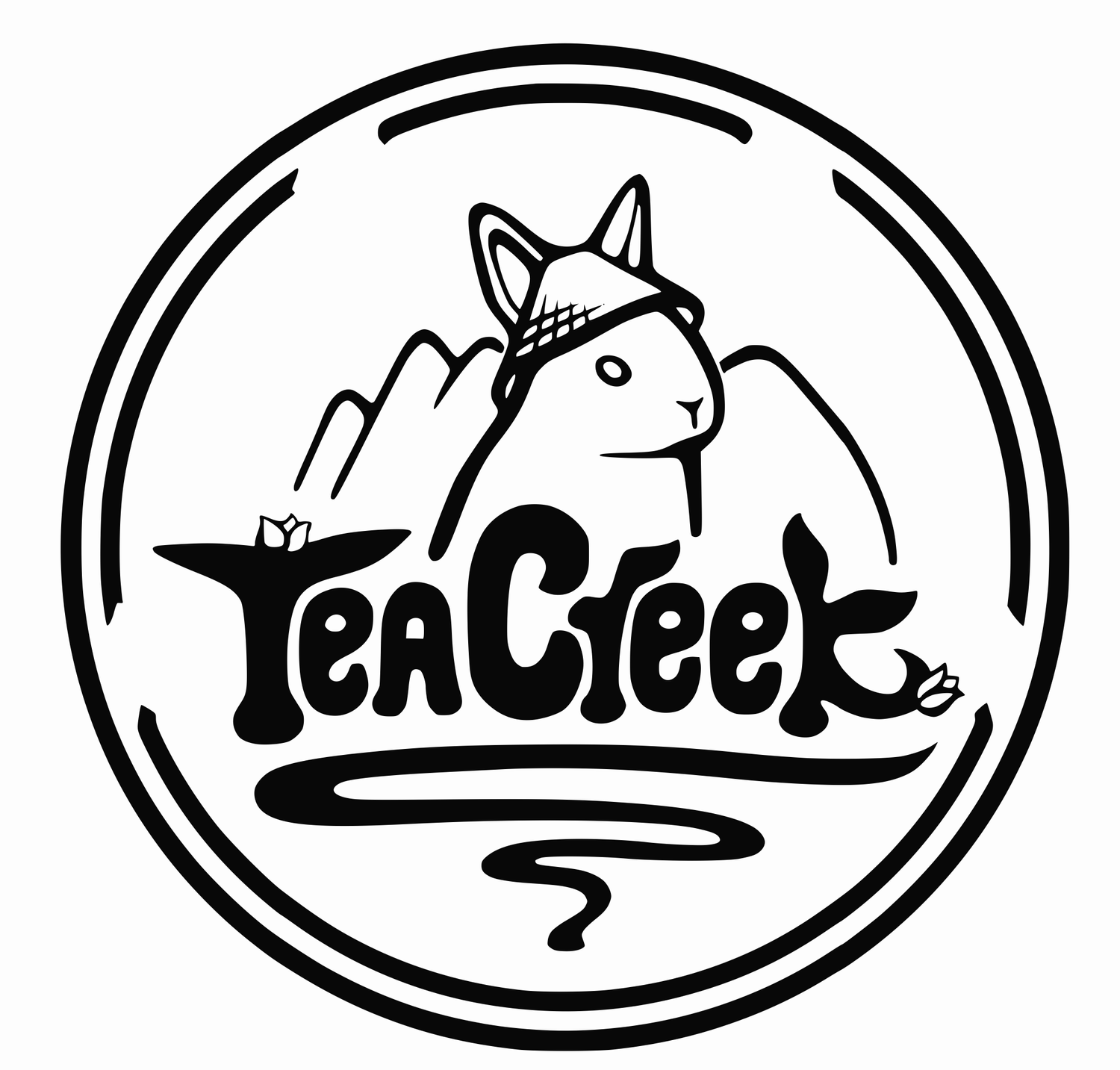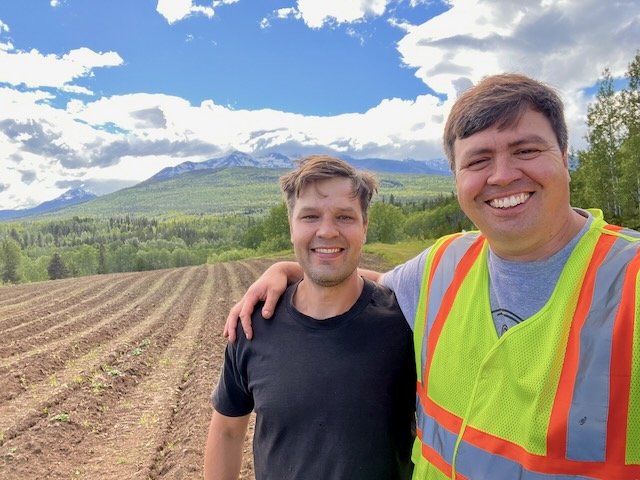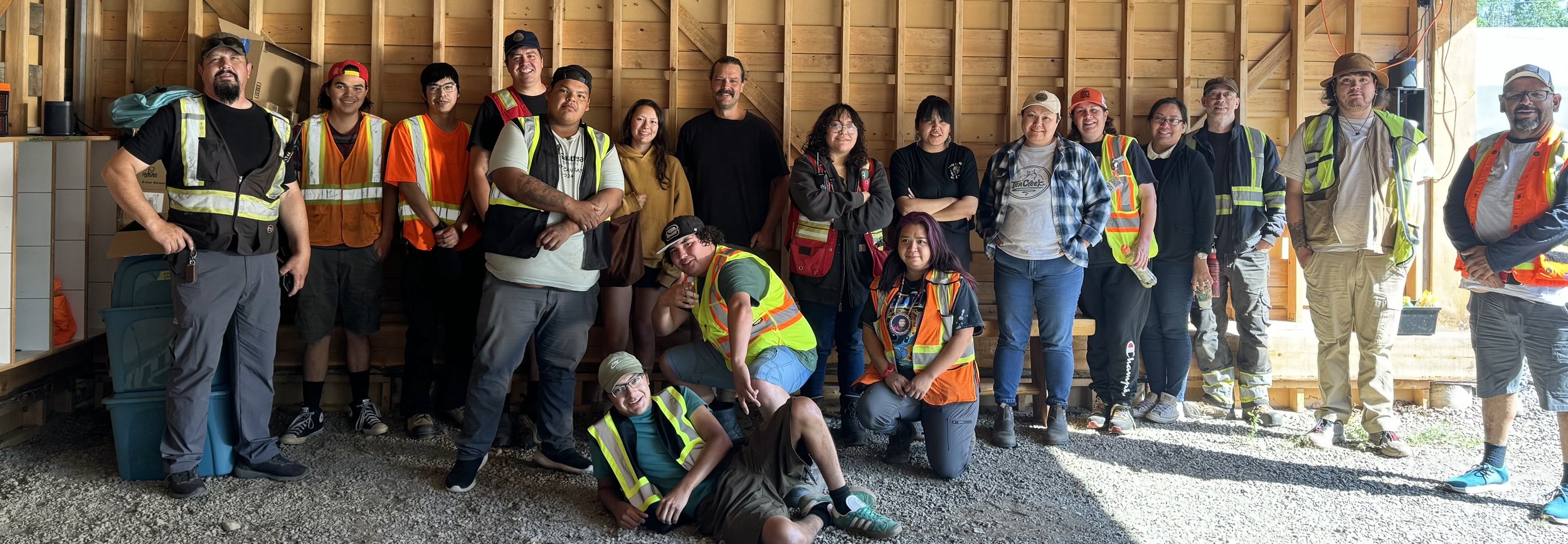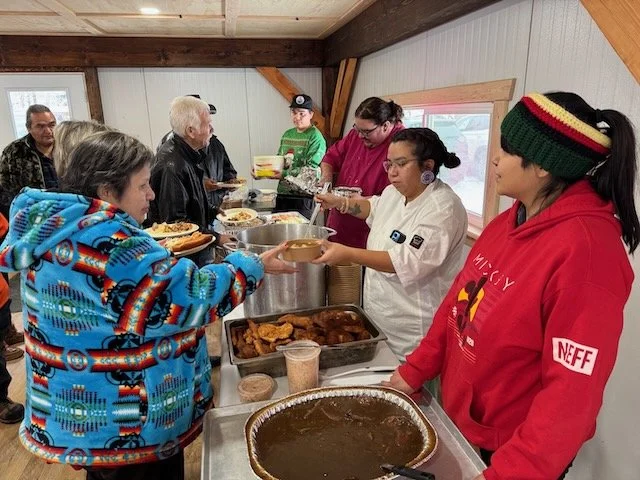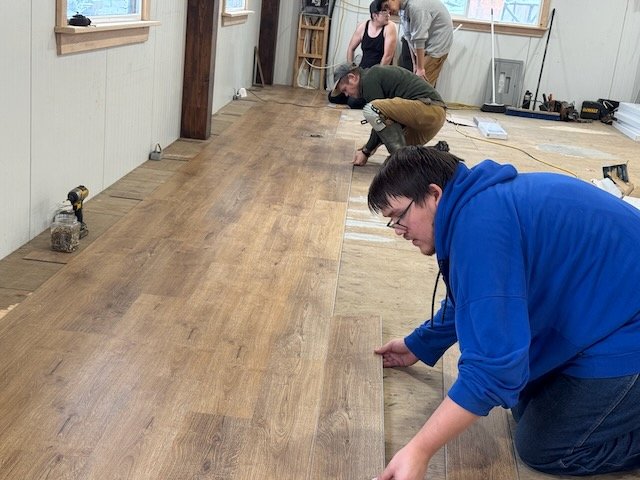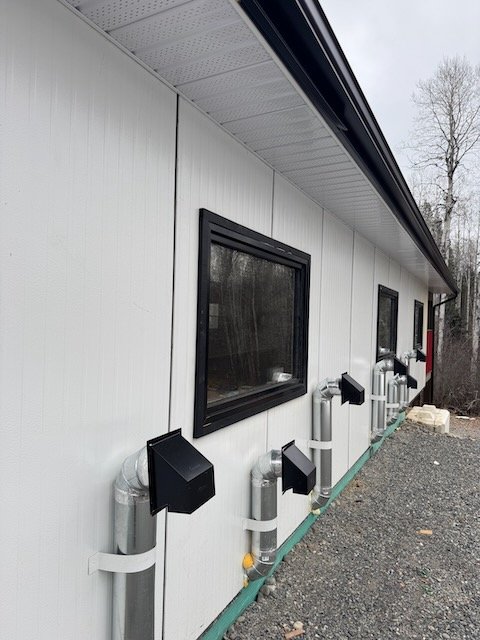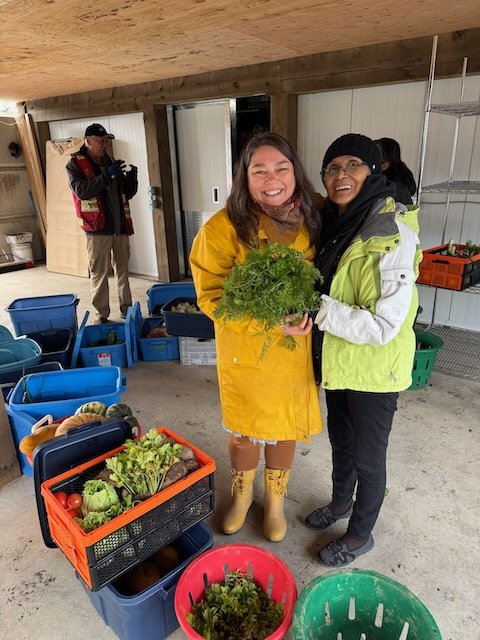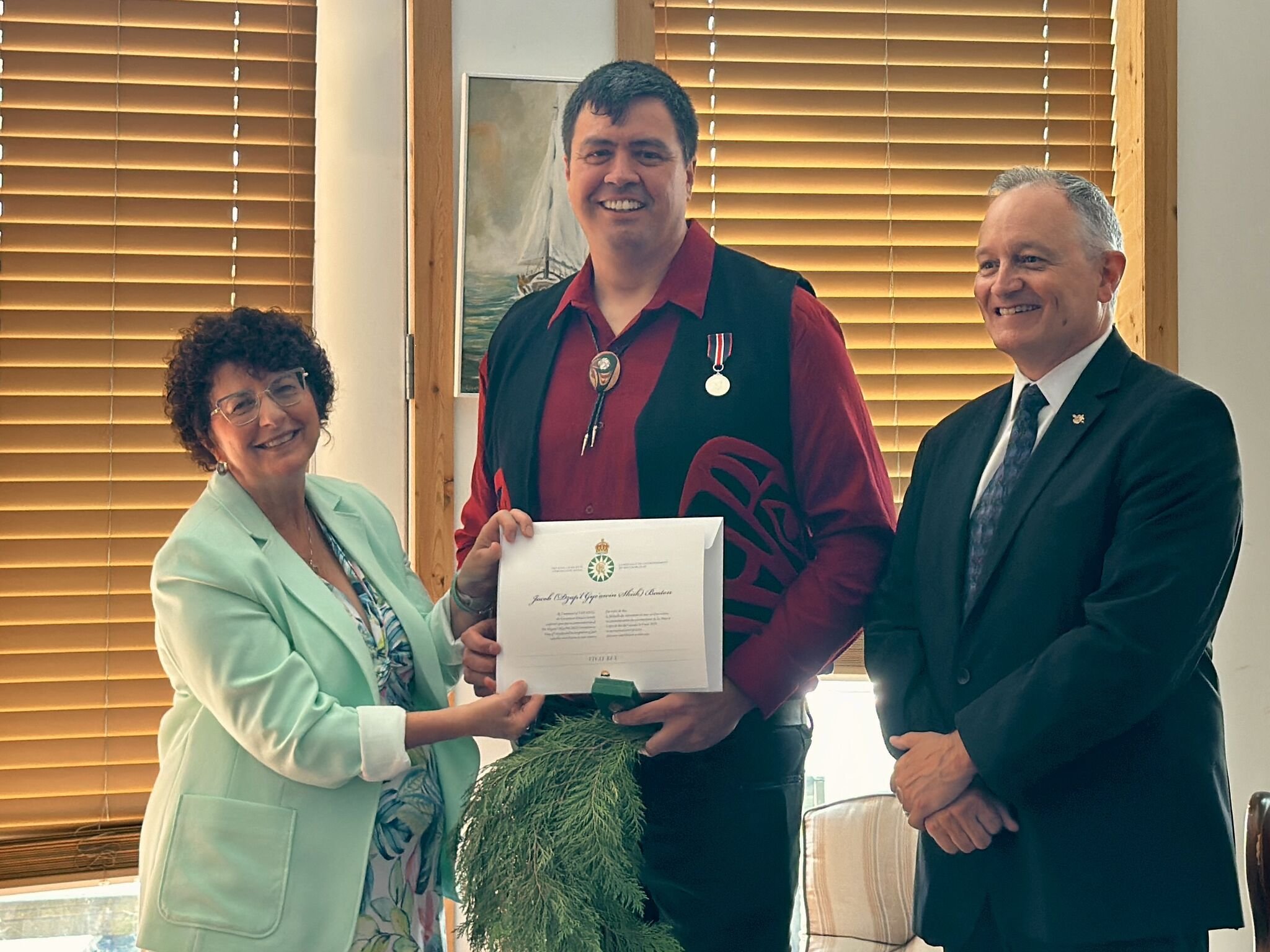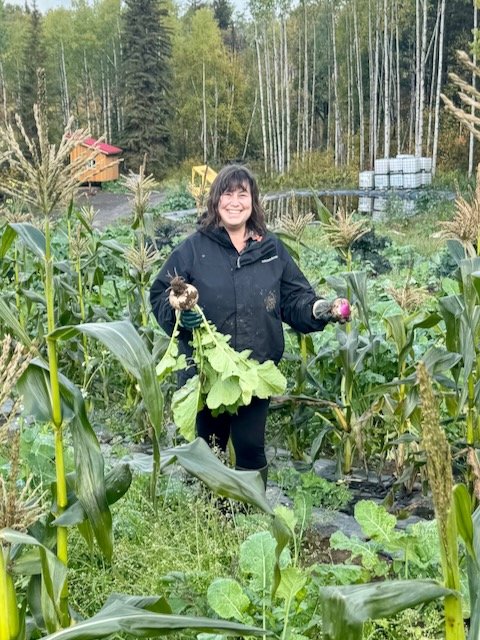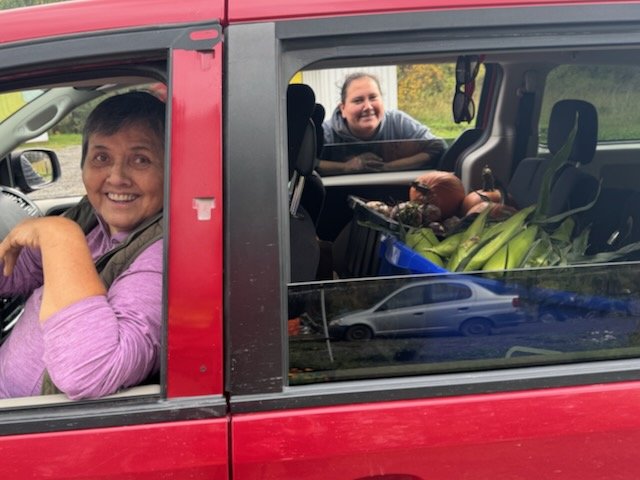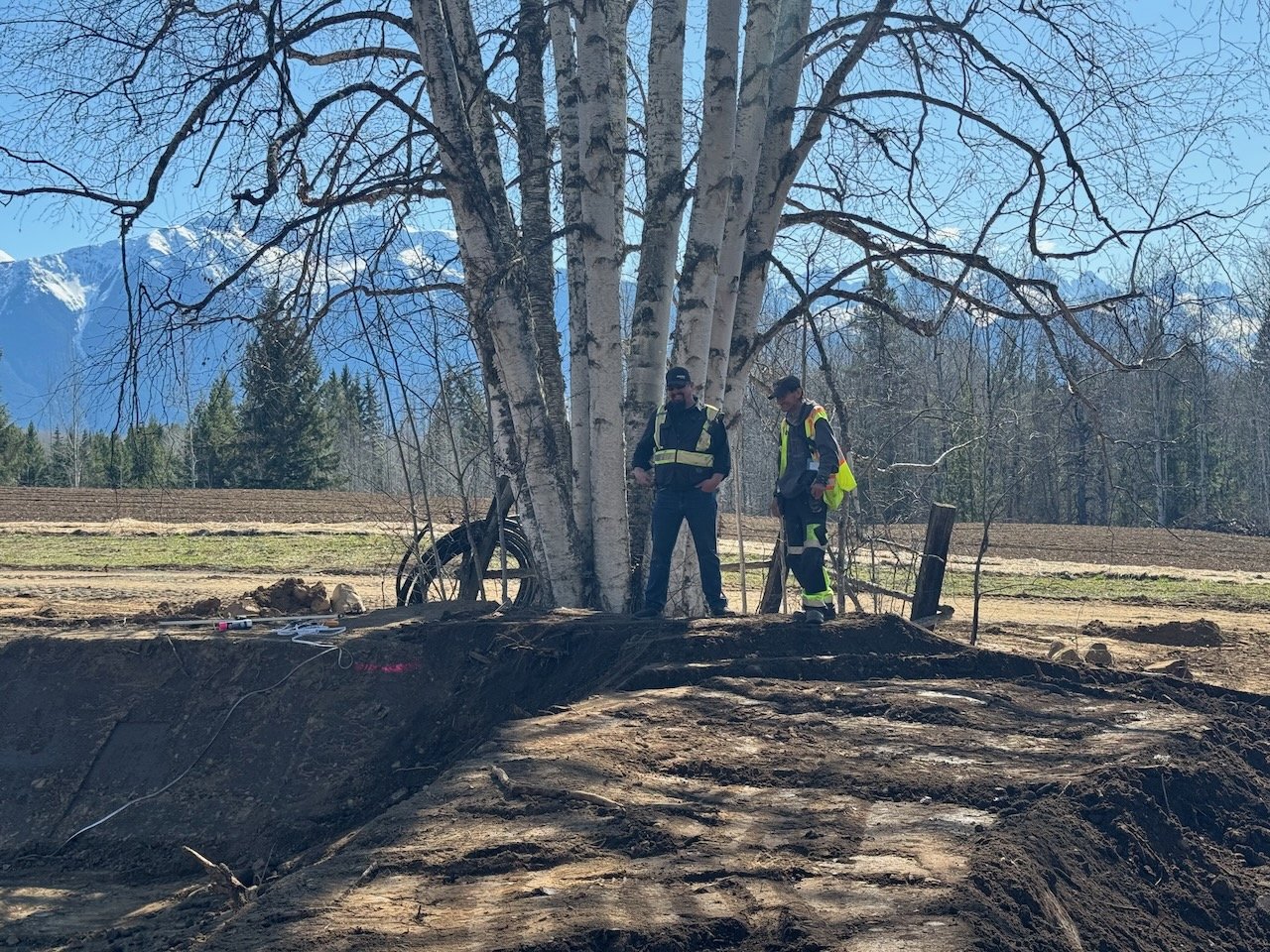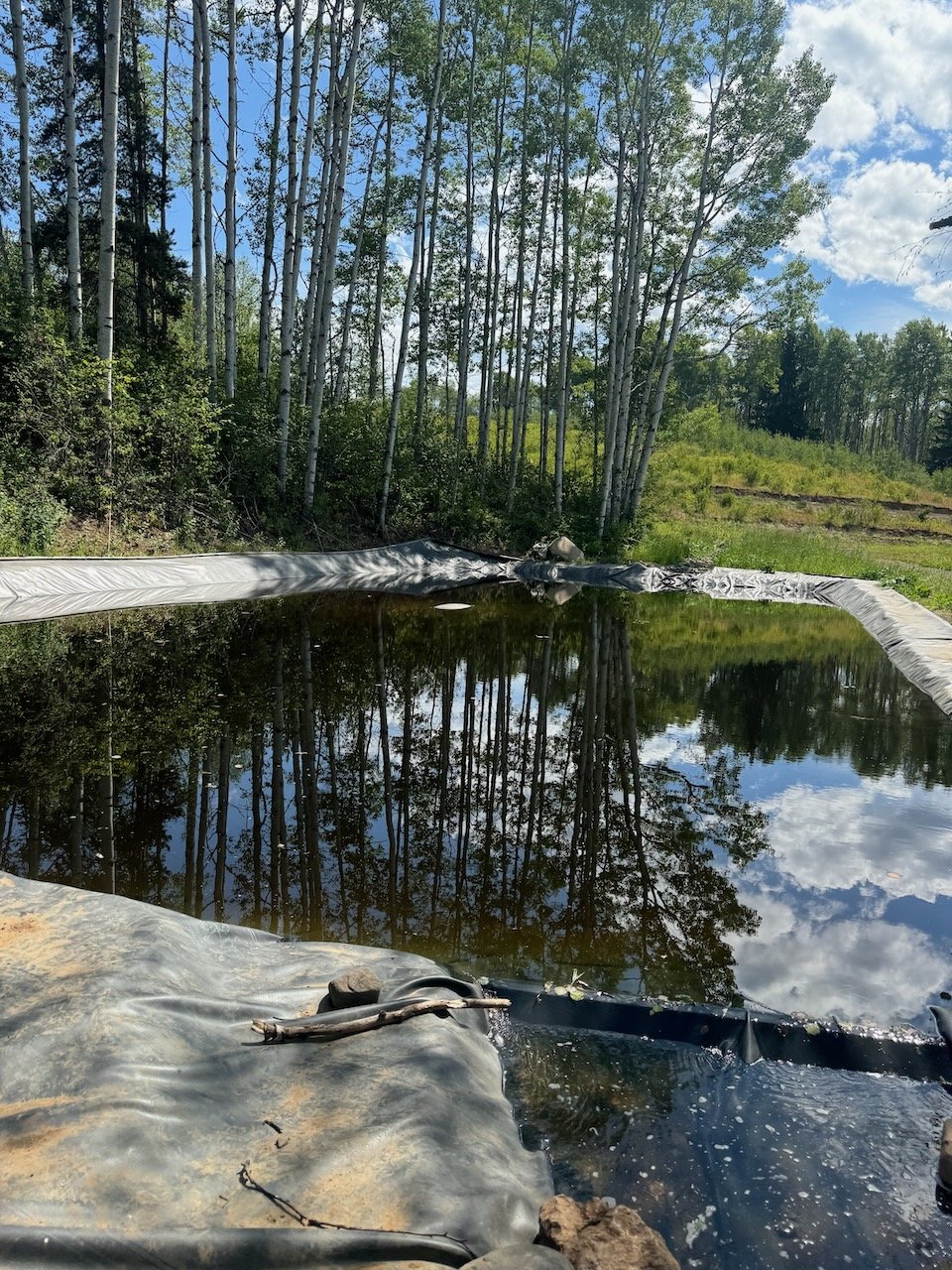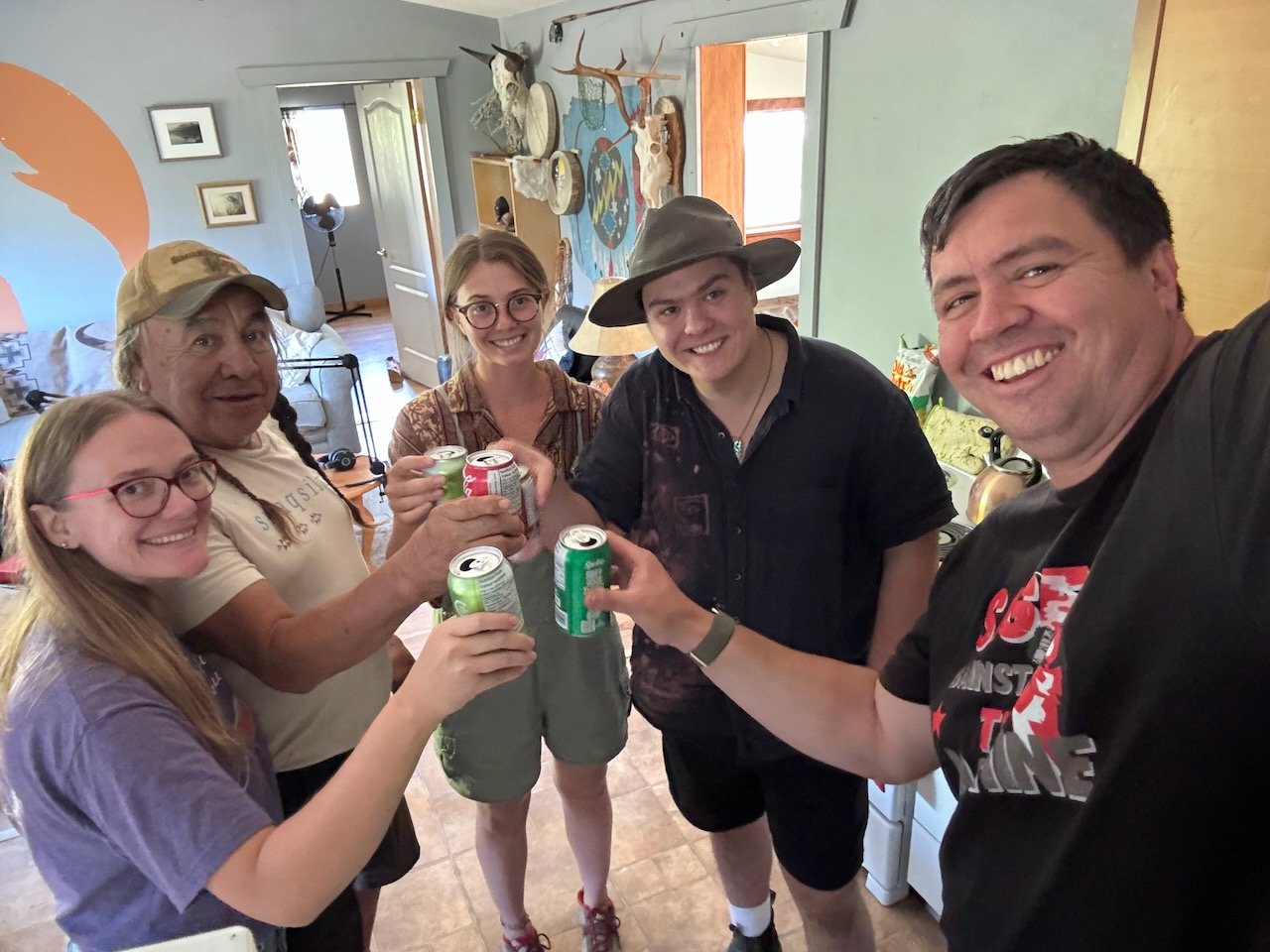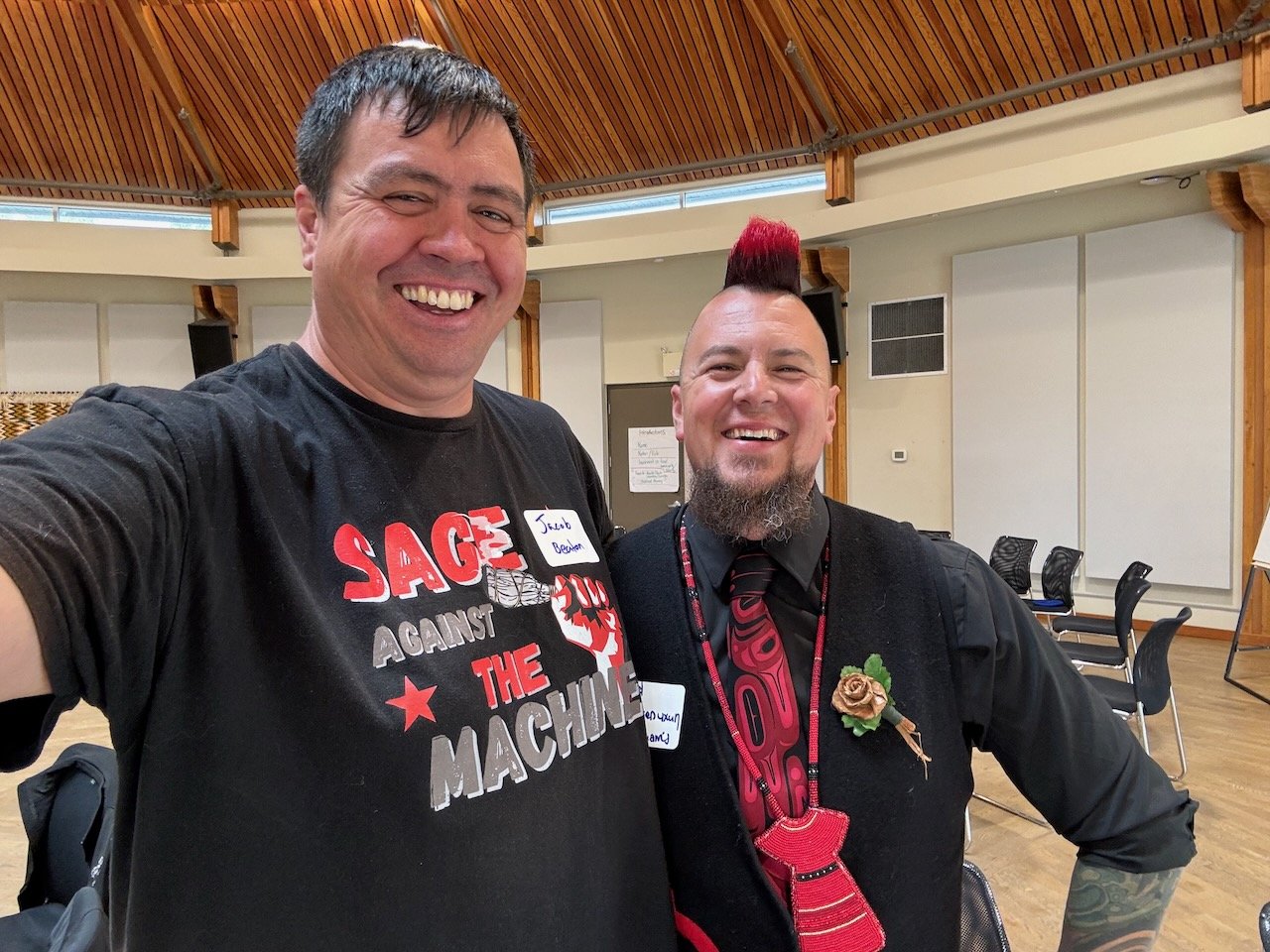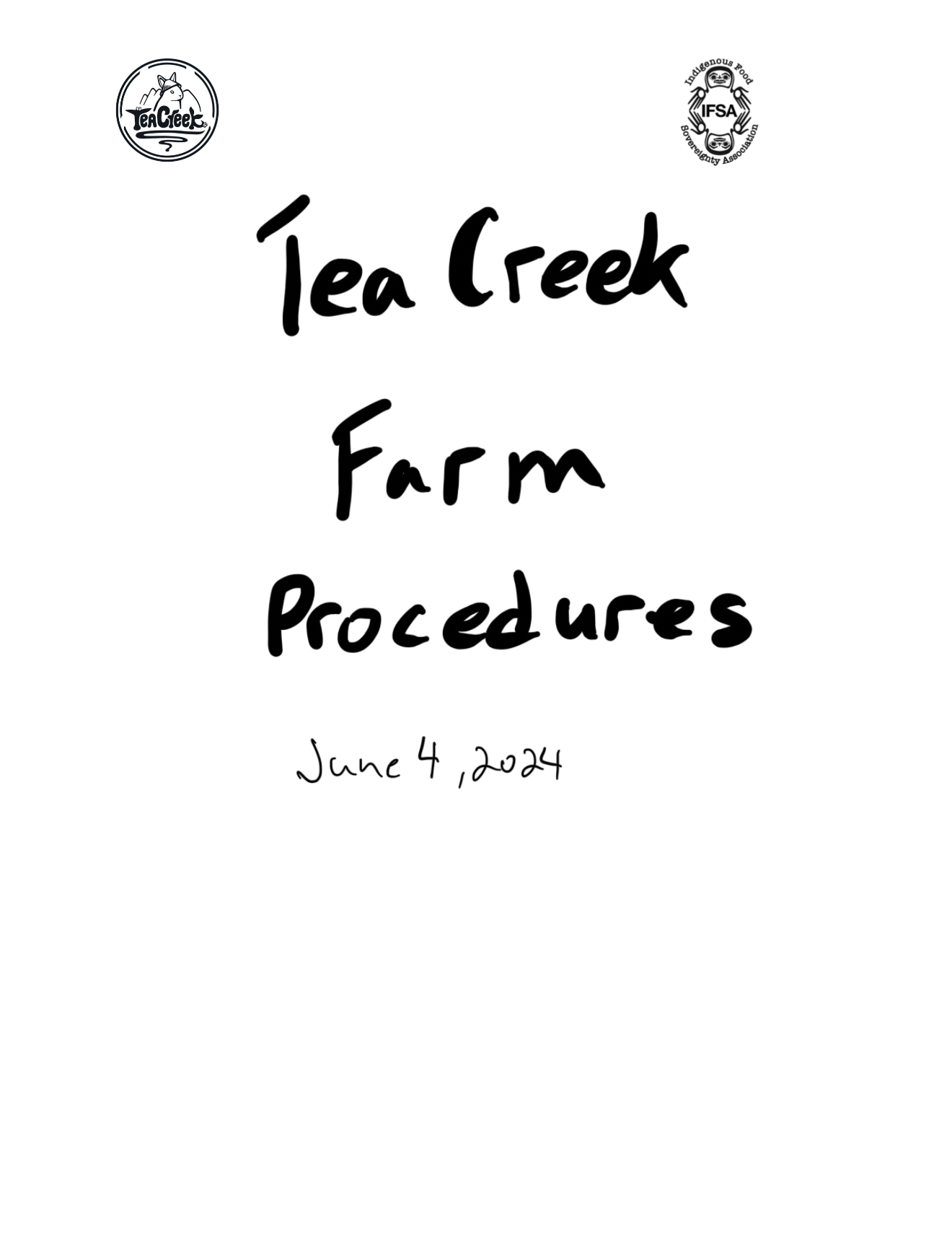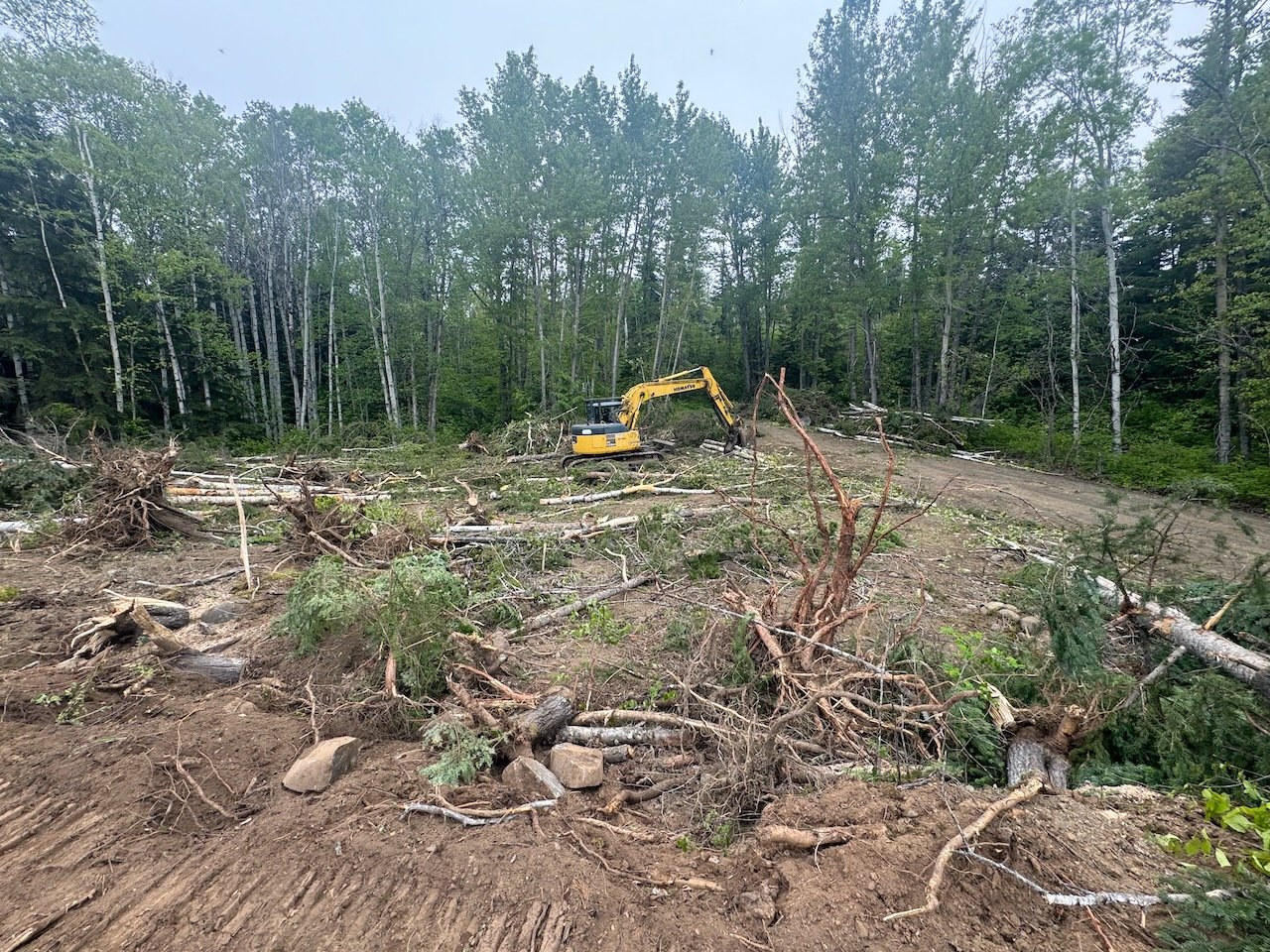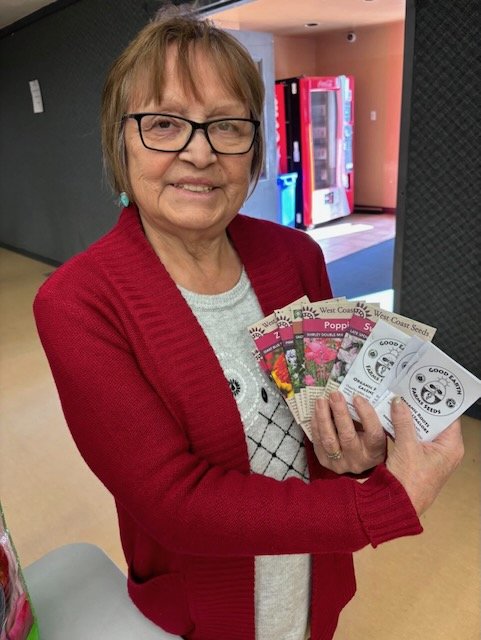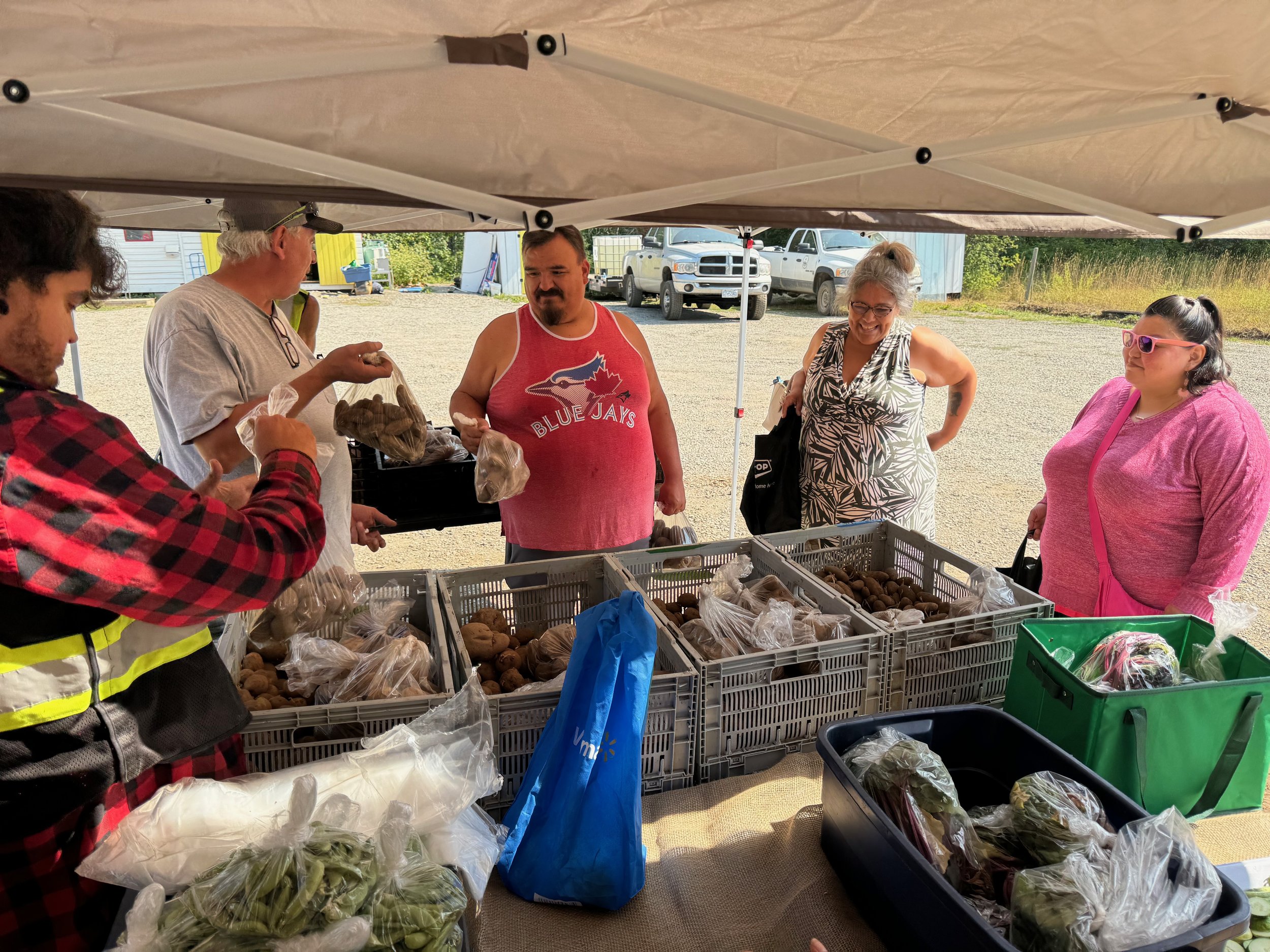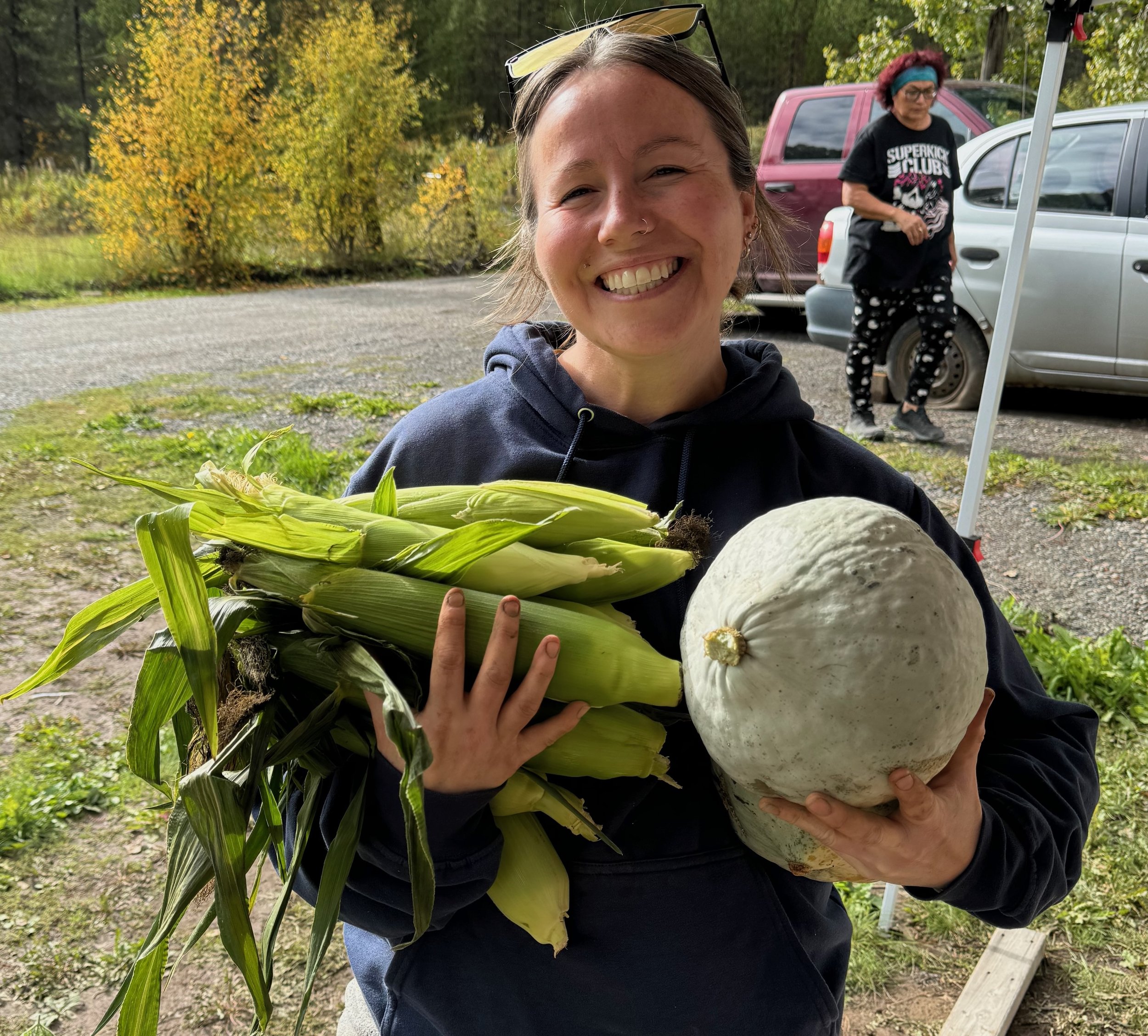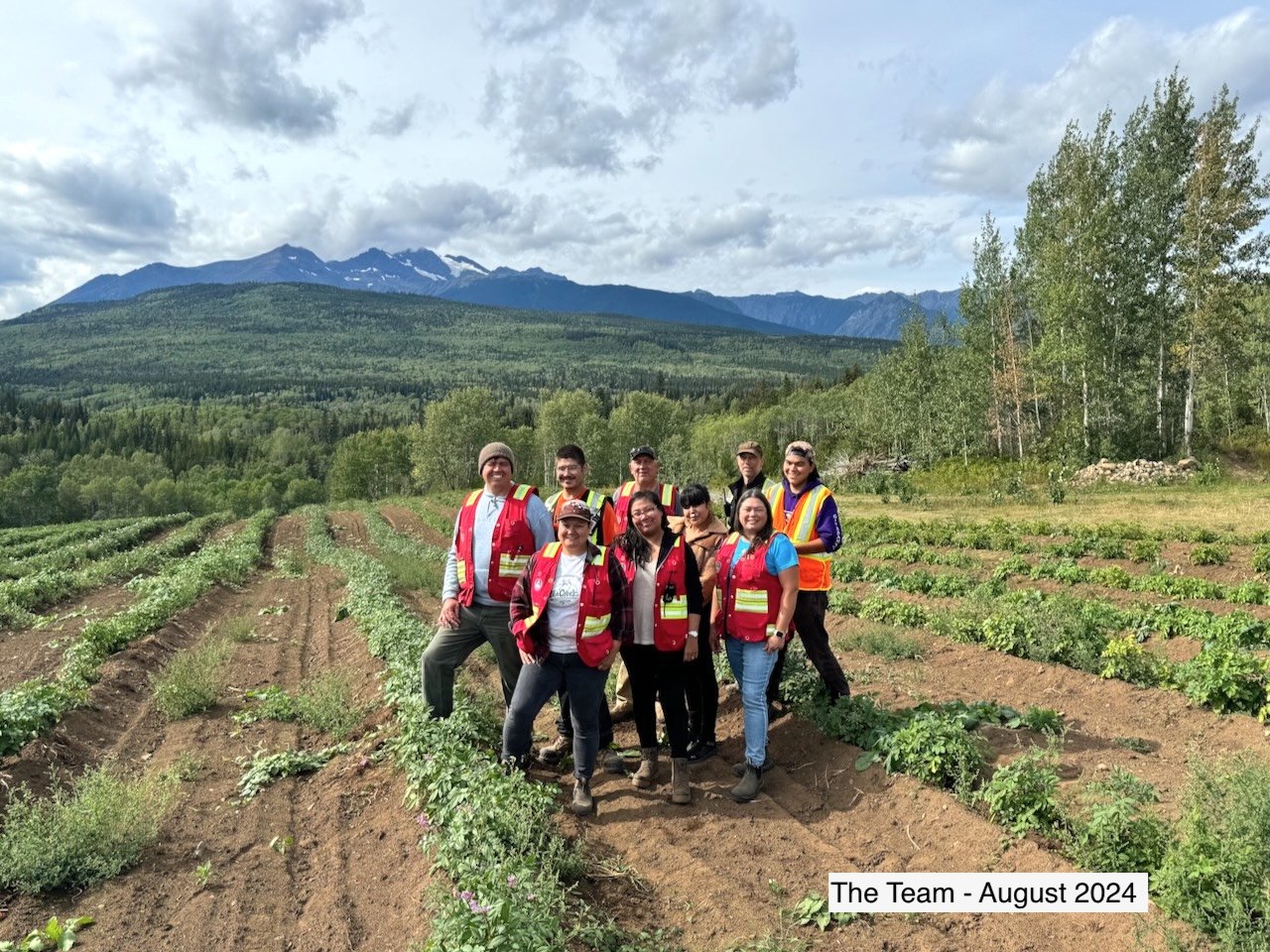
Tea Creek + Amisk + IFSA = Big Wins
A partnership between Tea Creek and our sister organization, the Indigenous Food Sovereignty Assn (IFSA) enabled us to deploy the Tea Creek model for the first time in another location. Julian Napoleon and his partner Gabby Applegarth own and operate Amisk Farm at Moberly Lake. Amisk is Julian’s ancestral home, and was his grandparent’s farm that he has revitalized.
Julian joined the Tea Creek team and received mentorship and support to deploy the Tea Creek model and IFEAST training at Amisk.
IFSA purchased half of Amisk farm’s produce, which was then given away through community farmstands and meals. This was a powerful experience for everyone at Amisk, and it brought much happiness to the community including elders and youth.
The success with Amisk this year proves that the Tea Creek Model can be deployed to other Indigenous-led, land-based locations through the IFSA network.
IFEAST Program Launch
Tea Creek partnered with SkilledTrades BC to launch our Indigenous Foodlands Employment Apprenticeship Skills Training (IFEAST) program this year. Our target was 30 enrolled trainees, and we had over 70 First Nations and Indigenous people enroll hoping to participate in our first season. As of this writing our first year of training is underway in two locations, at Tea Creek and Amisk Farm in Treaty 8 territory.
IFEAST is for unemployed or under-employed Indigenous peoples in BC ages 18 and up.
A big success this year was having 100% of trainees joining IFEAST at Amisk farm unemployed or underemployed, and then exit the program into jobs.
New Root Cellar & Multi-use Building
With core support from the FPCC Braided Infrastructure grant and other IFSA and Tea Creek funders, a state-of-the-art root cellar and multi-use building was designed and built using local labour and materials. IFEAST carpentry trainees gained valuable training and experience at every stage of the building process.
This fall Gitxsan hereditary chiefs were invited and attended a blessing ceremony to open the root cellar.
It is currently storing thousands of pounds of potatoes and other vegetables from the fall harvest.
The contents include precious rare local Indigenous varieties of seed potatoes which will be planted for next year.
Upstairs is a beautiful open multi-use space with a deck facing our food forest and Xii Dii (Tea Creek). Staff, trainees, volunteers and guests will enjoy being inside a timber-framed space using lumber donated by Simoigyet Gaxgabaxws. The space has already hosted community lunches and is the future home of IFSA and partner organization office spaces.
Local Economic Development
Employment continued to be the top expense at Tea Creek this year, with over 70% of revenues going toward employment expenses. Coupled with other local and regional spending on materials and supplies, well over 80% of Tea Creek revenues were spent in the local economy, meeting the definition of social enterprise.
Tea Creek is often the first job for many people to train or re-train and start their new careers. It is also a place where people start and develop their own businesses. Creating future paths for Indigenous people is a key part of our vision: “Resilient healthy local Indigenous communities and economies built on land-based programs and abundant local food.”
Tea Creek Film Premiers, Wins Awards
The Tea Creek Film - which started production in 2022 - premiered at DOXA in Vancouver to rave reviews and was one of the few screenings to sell out. Since the premiere, the film has won best documentary at the Saskatchewan Film Festival and has continued to be selected for exclusive festivals such as Planet in Focus.
The film is popular, and is showing a strong appetite for Indigenous stories and the solutions and hope that Tea Creek offers. The trailer alone went viral on Facebook and was viewed 162,000 times prior to the film coming out.
The film was created by filmmakers Ben Cox and Ryan Dickie, and was executive produced by CBC here in Canada. It is free to watch on CBC Gem here.
King’s Coronation Medal
Tea Creek’s Jacob Beaton was awarded the King’s Coronation Medal - one of three recipients in BC selected for leadership in Agriculture.
“I want to acknowledge my ancestors, my teachers - and all the Indigenous food sovereignty knowledge holders and practitioners who have protected and revived IFS through ongoing systemic racism and oppression. And to those who continue to work for a better community, economy, and planet for all of us.
Many thanks to our funders and supporters this year - Tea Creek and IFSA wouldn't exist without you! Also to those who nominated me, and many thanks to the Staff and Crew who work hard to run all our programs and initiatives.” -Jacob Beaton
Hundreds Participate in Community Harvest
With frost coming and still many crops in the field, we posted this video inviting community members to come and harvest - it went viral, getting tens of thousands of views overnight. We’ve done this in previous years, but turnout has been low. This time, we had 400 people come and harvest over two days, completely gleaning our fields and harvesting out over 10,000 pounds of fresh, nutritious food.
A wide range of crops were harvested from corn to tomatoes to potatoes and squash. The fresh food ended up feeding families, elders, community groups, and even school kids through a lunch program. Beyond food, it reawakened good memories in elders and families around gardening and farming - memories that were shared with youth.
Families came from far and wide. The most impressive was a family from Metlakatla, who got up bright and early to catch a water taxi to Rupert, and then drove all the way here to harvest as a family. It was a massive success that we may make an annual event.
Longhouse Food Hub Design
With the support of FPCC and other IFSA funders, a lengthy and beautiful design and pre-construction process was completed for a new longhouse at Tea Creek farm. The work done includes:
Environmental study
Geotechnical survey
Architectural concepts and engineered schematic drawings
Pre-construction planning
We are fundraising to build this beautiful complex, which would facilitate large-scale food processing, culture and education work, and trades programming. The cost for 1 longhouse is $2.5m, and the whole complex would be $7m. We could use your help!
New Ponds and Waterlines
With thanks to the ministry of JEDI and the REDIP program through IFSA, two new 400,000 litre irrigation ponds were added to the farm. A new 1.5” waterline “backbone” was added to the farm to move water between the ponds, fields, and the new irrigation well. Construction on the ponds and waterlines was completed, and the new system was used this summer to keep the crops watered and producing through a severe drought.
The ponds fill passively with snow melt and overflow into each other.
Our region of BC experienced a level 5 drought, which is the highest level in the provincial system. Until the fall rains, we had received less than 5” of rainfall all year.
In addition, frost-free standpipes were added and a portable solar-powered high-pressure water pump was set up to move water from any pond into the system.
A new pumphouse with pressure tank and switches was constructed.
Knowledge Sharing and Advocacy
2024 was a year with increased knowledge sharing and advocacy work, as we increased understanding of our history and also the possibilities to grow together for the future. Some of the highlights include:
MAF-supported Indigenous Food Sovereignty Discussion Paper Webinar. Attendance was much higher than expected. View the video here, read the discussion paper here. The paper is a roadmap and contains tools as well.
Free online crop planning and seed starting workshops, supported by PSFS and IFSA.
Participation as Thought Leader with the Auditor General of BC, provided insight into Indigenous performance metrics.
Expert witness to parliamentary committee investigating Indigenous procurement in Canada. View the video here.
Published videos over the year sharing knowledge from Tea Creek, many are available to see here. We had over 100,000 views of our videos on Facebook alone!
Tea Creek was covered extensively in the media in 2024, and a summary of coverage can be found here in the Media section of the website.
Growing the Network
We expanded our network this year within BC, Canada, and started on more international outreach. Some of the highlights include:
We connected with other Indigenous Food Sovereignty (IFS) champions in Vancouver and had important discussions around our past and future as a movement. We also travelled to Haida Gwaii for a conference and grew our network there.
We hosted the wonderful Heart Tattoo society from Vancouver for a week at Tea Creek and shared knowledge and resources with each other. Thank you!
We travelled to the USA and toured and met with various IFS champions including Pueblo, Hopi, Apache, and Navajo tribal territories. Highlights included Hopi - stewards of dry land farming technology, IAIA -an Indigenous-led institution that includes IFS foundations, and a 100% Indigenous-led Pueblo seed sanctuary.
We connected and conferenced with Chef Nephi Craig, subject of the amazing “Gather” documentary - officially connecting Tea Creek and Cafe Gozhoo.
We are fundraising to continue networking and would like to start Indigenous knowledge-sharing exchanges between network members.
Indigenous Housing Fund Application to BC Housing
Last year 15% of our registered trainees self-disclosed that they are completely homeless. Our region is the poorest in BC, and First Nations people live in far more crowded living conditions than non-First Nations people in this region - with a median of nearly 9 people per home. We feel the impacts of this daily, and so made it a priority this year to apply for an IHF grant to build a small apartment building on 3 acres we already own in town and already use to house trainees.
We applied for a Project Development Fund (PDF) grant in 2023 and we were accepted in 2024 about 4 weeks before the application deadline. We hired a development consultant and put together a strong application that checked all the boxes.
Unfortunately, despite our strong team, leadership, owning the land, and having off-the-charts demand, BC Housing rejected our application. Their decision was a surprise to us and the professionals who worked on the application.
New Harvesters Improve Efficiency
Two new harvesters were purchased this year and added to the fleet.
Potatoes are a crucial staple crop in our area. This year we pulled the trigger on a brand-new single row compact industrial harvester that allows space for workers to sort potatoes on the machine. The machine also features attachments that allow for bagging right there, or sorting potatoes into bins. This will increase harvest efficiency by 2-4x, and offer more advanced training opportunities.
Heating with wood continues to be the most cost-effective and logical way to heat. Toward the end of this season, we invested in our first firewood processor, which will cut labour costs for preparing firewood in half. Should this pilot project work well, we have visions of scaling this up and making heat affordable again for community members.
Toolkit and Systems Development
It is just as important to work “on” the business, as well as “in” the businesses, and we spent a lot of time improving the internal workings of both Tea Creek and IFSA this year. Highlights include:
Standardized contracts, checklists, and onboarding processes for staff and trainees. Updated and improved organization charts based on traditional thinking around roles and responsibilities rather than job descriptions.
Evolution of project management systems and habits, reformed around the “Cycle” and “Reset” system often used in the tech industry.
Development of a draft Farming Handbook, designed to be used with seasonal checklists and in-hand with Tea Creek training programs.
A library of internal training videos were created for staff, contractors, and trainees.
New State-of-the-Art Compost Site
Tea Creek has been composting since 2019, growing each year. We’ve also developed and delivered 1-day composting training programs. A scaled-up facility has been in our plan since 2020, and this year we developed a site for a future large-scale compost site that can handle up to 10,000kg of waste per week.
We used 100% Indigenous people to design, engineer, and develop the site.
We delivered a drone training program again, and trainees mapped the location, aiding in the design and then development of the site.
The site is 1 acre in total size and is ready to start operations in 2025 and 2026.
The compost site is designed to work for Industrial partners who currently spend a lot of money burning or disposing of food-related waste. It will not be a household compost facility at this time. There is planning underway for a 3rd phase facility that will be even larger. Most of the finished compost will be used on-farm to expand growing.
Seeds Distributed to IFSA Members
We received some incredible donations of seeds from Good Earth Farms and West Coast Seeds. The donations were incredibly thoughtful and generous, and an example of reconcili-action in our agriculture and food industry. The donations were so significant that it took our team weeks to sort them all out, package, and distribute out to IFSA members and other communities and community members.
We also opened the farm stand to offer the seeds and starts (baby plants grown from the seeds) for free into our local communities.
Charitable Application Completed
The charitable application process started back in 2022 as we raised support and funds for a charitable application process for IFSA. Funds were raised over 2023 and for much of 2024 our IFSA team and advisors worked away and we submitted this past fall. Our main purposes are: Education and Poverty Reduction.
The application is with Canada Revenue Agency and we are awaiting a decision. Thank you to those who supported us in this process! Also, many thanks to our Charity partner, Farm Folk City Folk (FFCF). You can donate to Tea Creek through FFCF.
Free Farm Stand Fridays
Our famous FFF (Free Farm stand Fridays) continued on in 2024 - at both Amisk farm and at Tea Creek! We started in July and continued on until the frost hit in October, serving many hundreds of elders, parents, kids, and families.
Our FFF included food samples, recipes, information sheets, and other education. We’ve noticed people’s appreciation and preferences shifting over the years to include a wider range of healthy fruits and vegetables.
All our food distributed was grown on our farm, over 25,000lb worth in 2024!
Our free, healthy, locally grown food has become a cornerstone of our communities. Thank you to all our funders who made this possible.
How You Can Help
Private-sector administered funds exceeded government contracts and funds for the first time in 2024. We wouldn’t succeed without your support. Click on the video to hear about four things you can do to support Tea Creek and IFSA.
Team Work Makes the Dream Work
All the success and wins of 2024 wouldn’t have happened without the hard work of our small and dedicated team. Many thanks to all the staff and trainees this year who worked hard to make our initiatives a success and impactful.
Thank you!
